If you are a chicken owner in a part of the world where you experience cold temperatures in winter, or fast temperature drops, you may be wondering if you should add heat to your chicken coop and how much heat your chickens need to stay warm.
We have a lot of experience around this subject, as we started keeping chickens (and honey bees) when we lived in the sub arctic, where temperatures would get into the -40’s C (which is the same in Fahrenheit).
When to add heat to your chicken coop
Before talking about best chicken coop heaters or a good chicken coop warmer, let’s first talk about when and why you should add heat to your coop .
You should add heat to your chicken coop if the temperature is below freezing and your chicken water will freeze. At that point, you will want to add enough heat to keep the water thawed, but not enough to keep your chicken coop warm.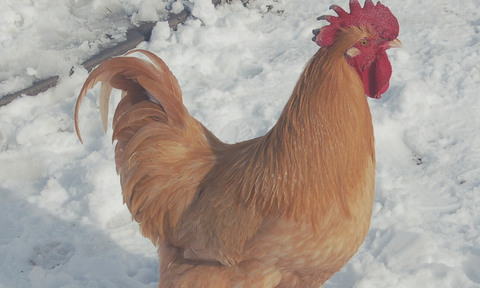
If you are raising chickens, you know they are not like people, but rather, they are more like little furnaces. Chickens build a tolerance to temperature variations and have feathers to cover their skin. They also will perch up high and close to each other when it gets cold you will notice.
The one thing chickens need is a constant supply of fresh water, so keeping water from freezing in your chicken coop is imperative.
You can read more about this in our article, when to add heat to a chicken coop.
In saying this though, you can purchase an automatic heated chicken waterer, and you can also have a safe heating element on hand for these cold days when they pop up through the winter.
You will just want to find a coop heater that will be safe for close proximity to your birds and will not be a fire hazard or cause over heating.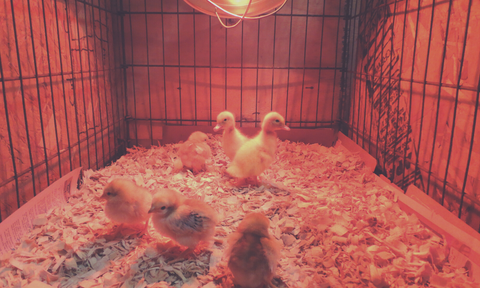
Let’s talk about the best coop heater to have on hand for cold weather.
There are different sources of heat and heaters you can add to your coop that are safe. Here are some options for you to consider for heat sources and how they fare in terms of heat output and safety.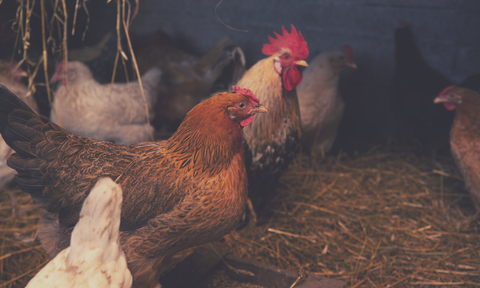
1. BEST CHICKEN COOP HEAT SOURCE: A Low Heat Output Chicken Coop Heater
Here is the one we recommend | CHECK PRICE
Here is the best heater for a chicken coop, and it is a safe heater as well. This source of heat for a coop is a low output panel heater that is specifically made to maintain an ambient temperature in a coop during cold weather.
It is not made to heat your coop with warm air, but will keep your birds warm with radiant heat.
This type of heater will keep chickens warm (but not hot, you don’t want that) and offers a safer alternative to potentially dangerous heat lamps.
And if you are looking for something to keep chicks warm, be sure to have a look at a brooder plate for baby chicks.
Here is some more information on this coop heater: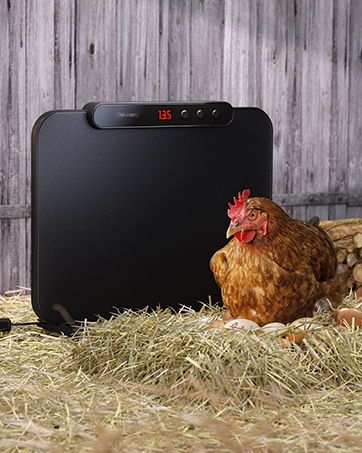
Flat Panel Heater: Energy Use
This is a 200 watt heater, and that is ideal for a coop in terms of heat output as well as energy consumption. To put it into perspective, a typical space heater uses 1500 – 2000 watts. So this 200 watt heater won’t make your chicken house hot, as this would climatize your chickens to a warm temperature in the winter.
Having your chickens feel used to the heat when it is actually cold out is dangerous, because if there were ever a power outage and they went from cozy warm to freezing nights, it would put them into shock.
This low output heating element will simply keep your chickens toasty enough, and more importantly, it will keep your coop from freezing, which is exactly what you want. Also, because it is such a low output of heat, it will also save you money on energy use.
Here is what the manufacturer has to say:
It’s safe and portable. The thermostatically controlled LED of this heater reduces the risk of frostbite during cold weather. The coop heater protects chickens from frostbite but does not overheat them. The surface temperature is kept at a comfortable temperature that is safe to touch.
Chicken Coop Flat Panel Heater: Safety Features
If this panel is tilted past 180 degrees, it has a safety feature built in so that it will turn off once this happens so there is no worry of fire. Also, The surface temperature is kept at a comfortable temperature that is safe to touch (70-150℉). This feature makes me feel really good about it.
Also, you can control the heating plate through the buttons on the panel, or through the remote control.
Chicken Coop Heater: Placement
Because this heater is flat, it can be easily mounted to a wall inside your coop, or, it can stand up on its own as it comes with feet. It is totally portable and will keep your birds warm, or as warm as they need their body temperature to be.
It is great for chicks to young chickens as well as your older flock, so you can use it in the winter for your coop heat, and as a brooder for chicks through the year!
2. A Ceramic Heat Lamp
Check price here
A ceramic heater would be our second option to keep your coop from freezing. Safer than a heat lamp, a ceramic bulb will still be very hot to the touch, and there is a low risk that a chicken would fly up into it or feathers would stick to it and cause a fire.
A bulb of any kind should be used with caution inside.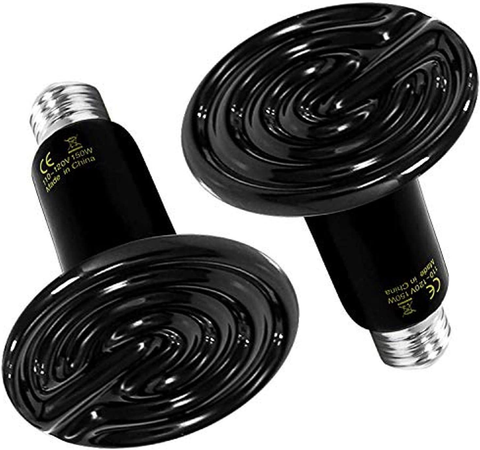
One other thing to note about a ceramic bulb, is that it will heat up but will not emit any light while doing so.
If you prefer a bulb of any kind for heating your coop, you may want to consider a chicken monitor outside the coop. Chicken monitors are great to have and an added benefit is keeping them on hand if you have a predator around.
3. A Heat Lamp/Bulb
Check price here
Heat lamps are another source of heat. We have used them in the past, however, these need to be used with extreme precaution as they get very hot, and chickens can fly up to them or chicken dust and debris can get up there as well.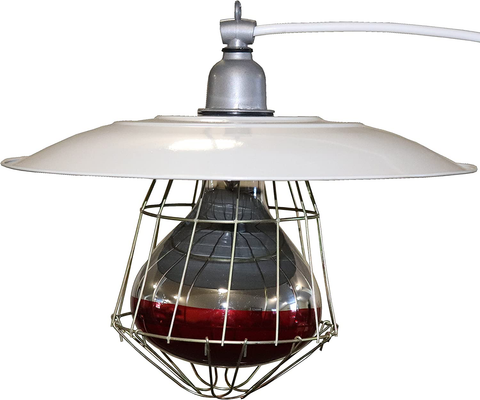
Having a heat lamp is a good backup option if you have nothing else and you live in very cold climates where the temperature drops or can drop quickly.
Using a heat lamp on the coldest nights or just when absolutely necessary is an option for extra heat.

Keeping Backyard Chickens Warm: Is It Necessary?
When it comes to keeping backyard chickens, they often become our pets. We love them and care about them, and it is perfectly natural to worry about them and their comfort level in freezing temperatures. I am sure it is often debated in households where one person wants to heat the entire chicken house and the other partner doesn’t want to.
Rest assured, chickens can handle the cold weather very well. There are also ways you can keep your chickens warm in the winter without electricity, but try to refrain from hauling typical space heaters into your coop.
You want the ambient temperature to simply be above freezing in there, and if you have a good, insulated coop, you can simply add a proper heater to make sure the water doesn’t freeze, then you won’t have to think about it again.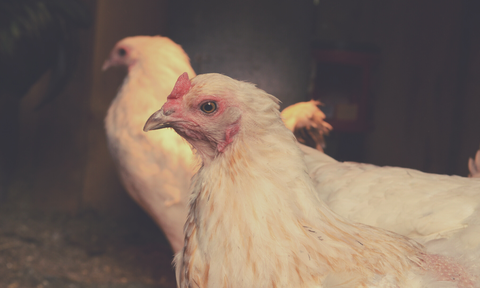
Chickens are good at keeping themselves warm and maintain constant heat under all those feathers, and you don’t want to add a heat source that isn’t a safe chicken coop heater. Small chicken coops or large chicken coops simply need to be above freezing temperatures.
If you are worried about frozen eggs, we would suggest determining when your birds are laying the winter (time wise) and checking for eggs more often.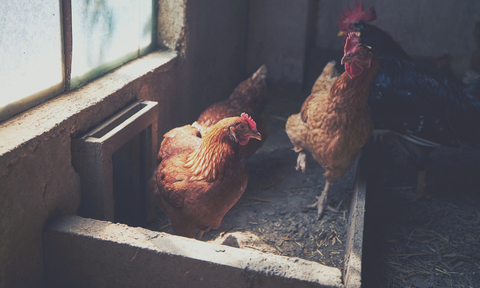
Here are some other questions people are asking about heating chicken coops:
What is the best chicken coop heater?
The best chicken coop heaters are ones that will not make your coop hot and will not have a fire risk. Look for flat panel heaters that are made specifically for a chicken coop. Don’t ever use a space heater as a coop heater.
Should I heat the entire coop?
When you are looking to add heat so your chickens stay warm, you are looking at heating your coop for the wrong reason. Chickens will be warm enough as long as the coop is above freezing, and you want your coop above freezing so the water does not freeze solid.
No need to try to heat their nesting box or any other area other than the main part of the chicken coop, and a heated panel will do this job perfectly.
Are my chickens warm enough?
You will know if your chickens are warm enough if the water in your chicken waterer is not frozen.
If your water is not frozen, you do not need to add a coop heater. However, if your water is a solid brick, you will need to add some source of heat so your chickens will be able to access fresh drinking water, and we suggest flat panel heaters over heat lamps for coop heaters.
Should you put a heater in a chicken coop
You should only add chicken coop heaters to a coop if the weather gets cold enough that the chickens water will freeze. If where you live has the possibility of the temperatures going below freezing, you should have a chicken heater on hand and ready to go as chickens need continuous access to fresh water.
What is the best heat for a chicken coop
The best heat for a chicken coop is radiant heat which means the heat is transferred form one object to another, and one where if the chickens get too close there is no fire hazard risk.
You may also want to consider a low output heat source in terms of wattage so it is an energy efficient option (for example, 200 watts would be energy efficient in terms of coop heaters).
You don’t need a large heater to warm the entire room like a space heater because you only want the temperature in your coop to be just above freezing, both for heat efficiency (and your electricity bills) and for the comfort and climatization of your chickens. Don’t worry if it doesn’t feel like a cozy coop; remember, what is cozy to you would likely not be cozy to the chickens.
BEST CHICKEN COOP HEATER: SUMMARY
The best heater for a coop is this flat panel heater that can either be wall mounted or can sit on the floor, and it can safely be in very close proximity to your birds.
Here is the #1 product we are recommending for the best chicken coop heaters:
BEST CHICKEN COOP HEATER
We hope we helped you find the best coop heat sources that are energy efficient, safe and will keep your chickens, poultry and chicks warm and their water thawed. Remember, your chickens don’t need to be warm per say, they just need to have the temperatures above freezing so their water is not a block of ice.
Here are some other chicken-related articles you may be interested in:
The Mask You Need For Cleaning Out A Coop
Automatic Chicken Waterers
How To Keep Chickens Warm In The Winter Without Electricity
Best Chicken Coop Cameras To Keep Your Flock Safe
Chicken Saddles To Protect Hens From Roosters
Best Ways To Bear Proof Your Coop
Did you like this article?
❤️ Here’s how you can support our blog:
My name is Linnea and I am a backyard gardening enthusiast! Along with my husband and our two kids (and chickens, ducks, honey bees and our little dog). Our hobby – growing our own food and making our meals from scratch. My blog, The Farmers Cupboard, is the website that blossomed from that passion. I love every second I spend sharing our hobby with like minded backyard growers.
It’s easy to support my blog, and it is so appreciated. Please SHARE an article somewhere, pin a photo to your Pinterest board, follow on any of our social medias or sign up for our newsletter! That’s it!
These little things help our blog grow and allow us to continue doing what we love: growing good food and sharing what we learn.
PINTEREST PASSIONATE? We’re opening up our cupboard to you!
Click on the pin below made just for you. It will bring you right to my little Pinterest community, where I would love for you to FOLLOW The Farmers Cupboard and see all of our gardening and backyard dream ideas!
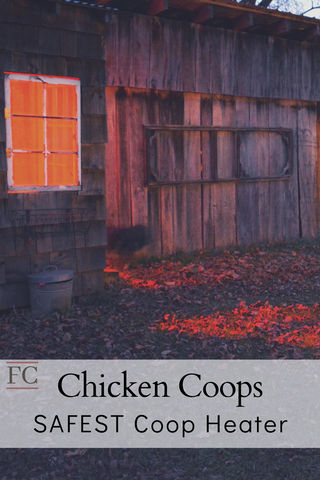
Let’s grow good things together!










